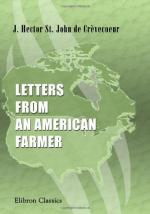If negroes are permitted to become fathers, this fatal indulgence only tends to increase their misery: the poor companions of their scanty pleasures are likewise the companions of their labours; and when at some critical seasons they could wish to see them relieved, with tears in their eyes they behold them perhaps doubly oppressed, obliged to bear the burden of nature—a fatal present—as well as that of unabated tasks. How many have I seen cursing the irresistible propensity, and regretting, that by having tasted of those harmless joys, they had become the authors of double misery to their wives. Like their masters, they are not permitted to partake of those ineffable sensations with which nature inspires the hearts of fathers and mothers; they must repel them all, and become callous and passive. This unnatural state often occasions the most acute, the most pungent of their afflictions; they have no time, like us, tenderly to rear their helpless off-spring, to nurse them on their knees, to enjoy the delight of being parents. Their paternal fondness is embittered by considering, that if their children live, they must live to be slaves like themselves; no time is allowed them to exercise their pious office, the mothers must fasten them on their backs, and, with this double load, follow their husbands in the fields, where they too often hear no other sound than that of the voice or whip of the taskmaster, and the cries of their infants, broiling in the sun. These unfortunate creatures cry and weep like their parents, without a possibility of relief; the very instinct of the brute, so laudable, so irresistible, runs counter here to their master’s interest; and to that god, all the laws of nature must give way. Thus planters get rich; so raw, so unexperienced am I in this mode of life, that were I to be possessed of a plantation, and my slaves treated as in general




